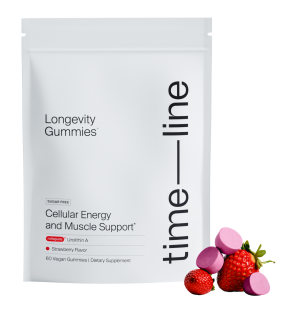Surveys reveal mood problems are surging in prevalence. In this detailed discussion from our friends at Protocol for Life Balance, you’ll learn about the role several familiar nutraceuticals may play for emotional wellness—plus a roll-out of a new innovative natural ingredient that promises enormous benefits.
—Dr. Ronald Hoffman
This article contains content from one of our trusted sponsors.
Feeling stressed, tense, under the weather, or blue is a perfectly normal and healthy emotional reaction to environmental stressors. While these emotions are normal, they can take a toll on our overall wellbeing and many of us may wish to minimize their impact on our health. Dietary supplements are a safe and affordable way to support emotional wellness.* It would not be possible to list all the dietary supplements available to support a healthy response to temporary environmental psychological stress in one article, so we will focus here on four compounds that can be found in dietary supplements: alpha-casozepine, ashwagandha, Myo-inositol, and theanine. Each of these used alone or in combination could help you cope with temporary stressful situations and may support healthy sleep quality.*Ɨ
Alpha-casozepine, also known as αS1-casein (f91-100) and commercially known as Lactium®, is a unique decapeptide (a polypeptide made of a chain of ten amino acids) obtained from casein found in cow’s milk. Alpha-casozepine was discovered by scientists while exploring how milk helps soothe and give contentment to babies. They learned that babies have the unique ability to metabolize casein into alpha-casozepine in their GI tract while adults do not. Researchers obtained alpha-casozepine by exposing casein to the enzyme trypsin and subsequently reducing it to a smaller peptide.
Laboratory experiments have shown that alpha-casozepine has selective affinity for certain receptors in the central nervous system, called GABAA receptors.* Here, the decapeptide stimulates the activity of gamma-aminobutyric acid (GABA), a neurotransmitter well known for its involvement in emotional wellness.* Alpha-casozepine has also been shown to help regulate cortisol release.* Cortisol is an important multifunctional hormone involved in the body’s reactions to environmental stressors.*
The clinical effectiveness of alpha-casozepine has been the subject of nine clinical studies, involving more than 500 adult volunteers. In one 30‐day randomized, placebo-controlled clinical study on adult female volunteers receiving alpha-casozepine at a daily dose of 150 mg, a significant improvement was observed in the subjective assessment of normal stress-related manifestations including, digestion (p<0.01), cardiovascular (p<0.05), intellectual (p<0.01), emotional (p<0.05) and social (p<0.05) problems.1* Furthermore, in a 12‐week randomized, placebo‐controlled clinical study on adult volunteers receiving alpha-casozepine at a daily dose of 300 mg one hour before bedtime for four consecutive weeks, researchers observed a consistent improvement in sleep efficiency in sleep diaries in the alpha-casozepine group (p<0.001).* This subjective improvement was confirmed with sleep actigraphy (p=0.007).2* Other studies have shown that alpha-casozepine is not addictive, even at a high dosage.
Ashwagandha is an Ayurvedic botanical “adaptogen” that is known to help the body adapt to typical daily stress.* There have been more than 35 chemical constituents isolated from the ashwagandha root. Amongst them, withanolides are believed to be the main bioactive compounds. Withanolides have been extensively studied and laboratory data suggest they interact with the GABAA receptor system, as well as many other neurologic pathways.* Withanolides are also known to support immune function and have free radical scavenging properties.*
These properties have been confirmed in clinical studies. For example, in a 12-week randomized, placebo-controlled clinical study on adult volunteers receiving a standardized ashwagandha extract at a daily dose of 600 mg (300 mg twice a day), researchers observed a significant improvement in fatigue (assessed with a self-evaluation fatigue questionnaire) in the ashwagandha group compared to baseline (p<0.0001) and placebo (p<0.0001).* In this study, the ability to cope with normal stress was evaluated as a secondary endpoint using a 7-point visual analogue scale; volunteers in the ashwagandha group reported a significant improvement in their ability to cope with stress versus baseline (p=0.0001) and versus placebo (p=0.0055).* Volunteers also showed improvements in their self-evaluation of quality of life.3* Furthermore, in an 8-week prospective, randomized, double-blind, placebo-controlled clinical study on adult volunteers receiving an ashwagandha root aqueous extract at a daily dose of 600 mg (300 mg twice a day), or 250 mg (125 mg twice daily), researchers observed a significant reduction of the scores on a perceived stress scale in both ashwagandha groups [250 mg/day (p<0.05), 600 mg/day (p<0.001)].* Serum cortisol levels were also positively modified in both ashwagandha groups [250 mg/day (p<0.05), 600 mg/day (p<0.0001)].* Compared to the placebo group participants, the participants receiving ashwagandha also had significant improvement in sleep quality [250 mg/day (p<0.05), 600 mg/day (p<0.05)].4* Ashwagandha supplementation is not known to be habit forming.
Myo-Inositol is the most abundant form of inositol, which is a necessary component of all cellular membranes.* It is a member of the B-vitamin family that contributes to muscular and nerve function, and participates in the metabolism of fats in the liver.* Its function in the brain is not well defined; however, it is thought to modify some serotoninergic and other receptor signaling systems.* In the body, myo-inositol is found in highest concentrations in the brain and central nervous system.* Myo-inositol is a versatile nutrient for the promotion of emotional and mental wellness, healthy eating patterns, and restful sleep through its critical role in neurotransmitter messaging systems.* Myo-inositol supplementation has been clinically evaluated. For example, in a double-blind, placebo-controlled clinical trial with 36 women, supplementation with myo-inositol (12 g/day for 6 consecutive menstrual cycles) resulted in significant improvements in standardized psychological assessment test scores when compared to placebo (p<0.01).5*
Theanine is an amino acid shown to be the constituent responsible for the calming properties of green tea.* Theanine can cross the blood-brain barrier and enhances healthy alpha brain-waveǂ activity, which is associated with a relaxed but alert state.* At the same time, theanine helps to support the health of brain cells exposed to typical stimulation from excitatory neurotransmitters and promotes the release of GABA, which in turn regulates dopamine and serotonin levels in the brain.* Clinical studies have shown that theanine can support relaxation without drowsiness and promote healthy cognitive function.* For example, in a double-blind, placebo-controlled clinical trial with 16 healthy volunteers (average age 27 years old), a single oral administration of theanine (200 mg) resulted in a significantly more relaxed score of VAMS (Visual Analogue Mood Scale), as compared to both placebo and a treatment of reference (p<0.05).6* Furthermore, in a randomized, double-blind, placebo-controlled clinical trial with 91 subjects with mild cognitive impairment (average age 57 years), supplementation with theanine (a combination of green tea extract + 480 L-theanine mg/day in two divided doses for 16 weeks) resulted in a significant improvement in Rey-Kim memory test , as compared to placebo (p<0.05).7*
As described above, alpha-casozepine, ashwagandha, myo-inositol, and theanine are clinically evaluated compounds working at different levels of the structures and functions of the nervous system and can, when taken alone and in combination, support emotional wellness by supporting healthy brain function and sleep quality without being habit forming or causing drowsiness.*
Protocol For Life Balance® offers these compounds in several dietary supplements, either as a stand-alone Myo-Inositol powder (6 grams per serving) or in combination with L-Theanine 200 mg (200 mg L-theanine plus 100 mg inositol per serving) or their newest product, Clinical Stress Relief, which combines Lactium® (alpha-casozepine) with a standardized ashwagandha extract. These products will allow you to tailor your supplementation program to your personalized needs for emotional wellness support and sleep quality without drowsiness.*
Ɨ Dietary supplements work even better when associated with other methods of relaxation such as aromatherapy, meditation, exercise, yoga, breathing techniques, and counseling. This article does not address the pathological side of stress and anxiety requiring professional mental health support.
ǂ Alpha brain-wave: When a group of neurons sends an electrical signal to another group of neurons, we call these brain waves. These brain waves can be recorded when doing an electroencephalogram (EEG) which is a test that detects and measures the electrical activity in your brain. There are several types of normal brain waves, the alpha type usually indicates that you are in a state of wakeful rest.
* These statements have not been evaluated by the Food and Drug Administration. These products are not intended to diagnose, treat, cure, or prevent any disease.
References:
- Kim J, Desor D, Kim Y, et al. European journal of clinical nutrition. 2007;61(4):536-541.
- Kim HJ, Kim J, Lee S, et al. Nutrients. 2019;11(7):1466.
- Cooley K, Szczurko O, Perri D, et al. PloS one. 2009;4(8):e6628.
- Salve J, Pate S, Debnath K, Langade D. Cureus. 2019;11(12).
- Gianfranco C, Vittorio U, Silvia B, Francesco DA. Human Psychopharmacology: Clinical and Experimental. 2011;26(7):526-530.
- Yoto A, Motoki M, Murao S, Yokogoshi H. Journal of physiological anthropology. 2012;31(1):28.
- Park S-K, Jung I-C, Lee WK, et al. Journal of medicinal food. 2011;14(4):334-343.







